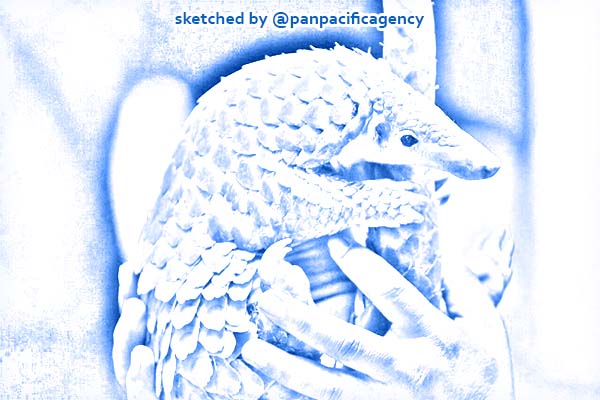Pangolins receive top state protected status in China

The pangolin, a shy and scaly animal, resembles an armadillo. Photo: Bali Zoo/Twitter. Sketched by the Pan Pacific Agency.
BEIJING, Jun 10, 2020, China Daily. The Chinese government recently upgraded the protection level of Chinese pangolins to the top level, a crucial move that is expected to boost rescue efforts and strengthen protections for the endangered species, China Daily reported.
The species, which used to be under the second level of State protection, is now listed among the top-protected animals, the National Forestry and Grassland Administration announced on Friday.
“The move echoes China’s strategic focus on ecological civilization that was raised by President Xi Jinping. It also shows our great determination to crack down on the illegal hunting and trading of wild animals and related products,” an official announcement by the administration stated.
According to the announcement, the administration will draft principles for field studies of the Chinese pangolin and further strengthen the surveillance and research on the species’ habitat and population.
Further, it will designate some core protection areas based on the habitat survey.
“Raising the protection level also means tougher regulation and actions on fighting against the illegal hunting and trade, which are in urgent need,” said Wu Shibao, a zoology and ecology professor from South China Normal University in Guangzhou, capital of Guangdong province, who has conducted research into pangolins for years.
He said the move will also raise public attention on protection of the Chinese pangolin, which will benefit the species long-term.
The World Wildlife Fund also spoke highly of China’s move and said it would strengthen protections for the Chinese pangolin and could offer the world’s most trafficked mammal an important respite from its illegal trade.
The WWF said on Monday that the decision is expected to strengthen the focus on pangolin monitoring, rescue and conservation in China, as well as help ensure stricter enforcement of wildlife laws and penalties.
On Tuesday, local media reported that pangolin scales, which were believed to promote blood circulation and reduce inflammation in traditional Chinese medicine, have been officially removed from the Chinese Pharmacopeia, meaning the scales will no longer be recommended to be used as a medicine.
“The value of pangolins to the ecosystem is much more than the value of their meat or scales. There is a long way to go in protecting them, but we can start by rejecting the consumption of products made from them,” said Zhou Fei, chief program officer of WWF-China.
According to the WWF, populations of Asian pangolins are estimated to have declined by up to 80 percent in the last 10 years with the Chinese, Malay and Philippine species among the critically endangered on the International Union for Conservation of Nature’s Red List.
The Chinese pangolin is a shy, elusive and secretive animal whose body is covered in hard, keratin scales. In the past five years, about 50 of the creatures have been found in the wild, nine of them newborns, according to Zeng Yan, an engineer at the Chinese Academy of Sciences’ Institute of Zoology.
According to a national wildlife survey conducted by forestry authorities in the 1990s, there were some 60,000 Chinese pangolins in 11 provinces, including Yunnan, Hunan, Guangdong, Sichuan and Zhejiang.
In past decades, the species’ population has witnessed a sharp decline due to habitat destruction, rampant poaching and smuggling.
Smugglers have targeted the animal for its scales, which are used in TCM as a cure for hangovers, to treat liver conditions and help new mothers breast-feed. Pangolin meat is also high in nutritional value.
In 2007, China banned pangolin hunting, and since October it has suspended all commercial imports of pangolins and related products.
In 2017, the IUCN placed Chinese pangolins on the Red List of Endangered Species after a team of experts determined the population had dropped by 90 percent over the previous decade.
According to Wu, the exact Chinese pangolin population remains unknown.
“It is very difficult to calculate the current population, as this nocturnal animal usually lives underground during the day and moves from one place to another more than 10 times a year,” he said. “But there is no doubt the species will be on the verge of extinction if no further protective measures are introduced.”
To save a wild species from extinction, breeding in captivity is the preferred option in most cases.
But according to Chen Jinping, a researcher from the Guangdong Institute of Applied Biological Resources, as studies on the Chinese pangolin are still at a very early stage, scientists have not even reached a consensus on the species’ duration of pregnancy.
Moreover, Chen said, the pangolin has a very strong response to stress, meaning it easily becomes nervous in captivity. “Their immune system is weaker under heavy stress. Also, their willingness to mate is affected,” he said.
According to the announcement, the administration will support the establishment of a research organization to study the Chinese pangolin.
The organization is expected to develop captive breeding technologies for maintaining the size of the species’ current population.